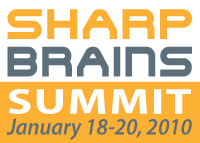Pumping up the Brain: Reflections on the SharpBrains Virtual Summit
On January 18–20, 2010 Alvaro Fernandez and his team at SharpBrains put together a splendid  line-up of speakers on a wide range of topics related to emerging brain fitness research, technologies, and markets, and clinical cognitive and mental health issues. IFTF was proud to be a sponsor of this event.
line-up of speakers on a wide range of topics related to emerging brain fitness research, technologies, and markets, and clinical cognitive and mental health issues. IFTF was proud to be a sponsor of this event.
Although the conference was virtual, aside from the rigors of travel and a basket of bagels on the hallway table, my level of intellectual stimulation (and fatigue) mirrored most of my face-to-face conference experiences. It was a technical success and the content was first-rate.
The conference was a great opportunity for us at IFTF to gather data and map the research landscape in cognitive fitness, especially as it relates to our 2010 Health Horizons research project around “Neurocentric Health.”
I’d like to share a small sample of the observations, shifts, and points of interest we took from the conference.
1. The forecast of Dr. Michael Merzenich, an expert in brain plasticity, that clinical practice and treatment will move from drug/surgery-based interventions to non-invasive techniques, practices, and preventative coaching is profound. This would change the timing, level, and quality of treatment interventions, and could be a significant catalyst to the (arguably) needed change in medical/clinical point of care and culture that Dr. P Murali Doraiswamy of Duke University mentioned as well. This shift would impact the insurance industry and risk profiles, payment mechanisms, and, most importantly, might be better for patients as well.
2. I am always wary of reductionist models and the tendency to focus our attention on certain organs or methods at the expense of the whole system. This hesitation is especially important when the focus is on the brain. I was very happy to hear most of the presenters and researchers talking about the brain in terms of an ecology–as integrated within a mind/body/environment relay system. I think this is a very positive sign for the direction of the field of brain fitness, and hopefully for the brain sciences at large.
3. It is clear there is major shift occuring in the allocation of resources (financial, intellectual, infrastructural) into brain and cognitive fitness. The tsunami of aging boomers will make this space even more appealing to researchers and investors. The clear sign that cognitive fitness works best when started early also points to not just boomers, but people of all ages, as a potential market and benefactor of these techniques.
4. The understanding and mitigation of risk is being transformed. Having more complete and powerful assessments of our cognitive abilities, and being able to track these over time in comparison to personal past performance, as well as the larger population, will be a powerful tool for understanding and intervening in certain activities (like driving a car). The results Tom Warden shared on the reduction of accidents from people who engaged in Allstate’s cognitive improvement program was telling of the positive impact that training can have on our everyday lives.
5. The dynamics between scientific researchers and market entrepreneurs will be interesting to watch. Clearly, the field of legitimate researchers in cognitive fitness does not want to go the way of neutriceuticals, in which the market was flooded with exaggerated claims, shoddy products, and hucksters of all kinds. The need for rigorous testing, regulation and standards is clear. However, one must be careful not to squeeze out innovation by walling off the field only to those who meet certain certifications. The desire for legitimacy might be used as a weapon of control and choke off potential partners and innovators who may be able to bring the benefits of cogntiive training to large numbers of people.
We will be working and thinking about these issues and more, and thank Alvaro and SharpBrains for creating a very useful platform to share information and engage in this important conversation.
 – Jake Dunagan is a Research Director at the Institute For The Future. His research examines the role of emerging technologies in transforming subjectivity, culture, and governance, and he has been leading explorations into new methods for communicating foresight. Jake is currently completing his Ph.D. at the Manoa School of Futures Studies on neuropolitics, neuropower, and alternative futures for the extended mind. You can visit his blog Here.
– Jake Dunagan is a Research Director at the Institute For The Future. His research examines the role of emerging technologies in transforming subjectivity, culture, and governance, and he has been leading explorations into new methods for communicating foresight. Jake is currently completing his Ph.D. at the Manoa School of Futures Studies on neuropolitics, neuropower, and alternative futures for the extended mind. You can visit his blog Here.
- Link to SharpBrains Summit: Here.


